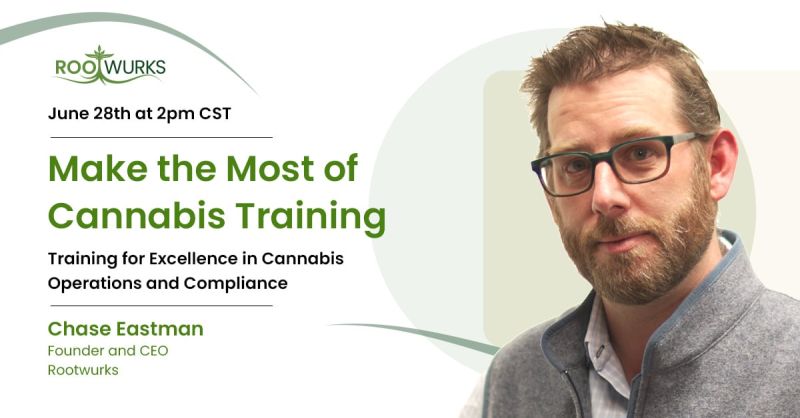Author: Chase Eastman | July 5, 2023 | 4 Min Read
Why Cannabis Training Shouldn’t Be a Hostage Situation

We all remember playing the telephone game as kids. It starts with a whisper given in confidence and ends - typically - with something that bears little resemblance to where the game began.
Something similar happens with on-the-job learning. Someone on the floor has a question about company safety or compliance protocols so they head to one of the veteran members of the staff. The veteran passes on their knowledge about how things are done at the company, which is then passed from ear to ear, taking on a mind of its own.
With training that is reinforced consistently by employees “in-the-flow-of-work,” best practices become second nature, boosting safety and compliance without having to rely on a broken telephone message.
I was reminded of the telephone game last week when I took part in a webinar hosted by the cannabis law firm and Rootwurks partner Vicente LLP. Featuring Vicente LLP Director of Regulatory Compliance Genevieve Meehan and Maureen McNamara, the Founder and Chief Facilitator at Cannabis Trainers, the webinar was a great opportunity for us to cover what makes cannabis training stick and what we as managers can do to meet team members where they are in their learning journey.
Building the right relationships
Near the start of the webinar, Maureen McNamara from Cannabis Trainers made some excellent points about the importance of interpersonal relationships when it comes to the success of training programs.
McNamara described the three people who take part in employee training: the manager, the learner, and the facilitator.
McNamara said that all three are key to training, but that the relationship between the employee and manager is almost more important than the facilitator. Also, what happens before the training takes place can make all the difference.
“What happens before and after [training] is essential for a positive learning experience - having a moment with the learner before they go to training, setting expectations, meeting the needs, and then after the training, managers must follow up and hold folks accountable for implementing what they learned.”
She added that training ”does not stop with the learning event itself, it has to have that setup and follow-up to be impactful.”
But the takeaway that will probably stick with me the longest was when Maureen discussed steps companies can take to avoid “hostage situations.” Obviously, she didn't mean literal hostage situations, but training in which employees feel like they are hostages forced to endure a battery of coursework as they become more miserable with each passing minute.
“Training can look like a conversation, with quizzes and assignments meant to verify training. It can be done in a super quick, easy on-the-job style,” Maureen said.
In the flow of work training in a young industry
During the webinar, Genevieve hit upon one of the things that makes training and education in cannabis so complicated: cannabis is a dynamic industry and things move quickly.
“We’re a small enough industry and with the frequency of changes, training and packaging and labeling [requirements] isn't something that you can simply check a box once a year. It requires active participation and retraining from all staff,” Genevieve said.
Repetition, retraining, and verification: all of them are essential to training in cannabis.
In most places of work, we tend to become blind to things that we observe all the time on a daily basis. This is why cannabis companies need to constantly refresh and validate their training protocols as a team so that they don’t miss gaps in training. This is also why third-party validation can make such a big difference - it can help managers catch and correct things that people may naturally forget.
Genevieve also hit upon something that is one of our core principles at Rootwurks: the importance of training “in the flow of work” be it through tools like checklists or direct conversations with managers.
“We’re working in a very rapid-paced industry that is also evolving at a quick pace so the reinforcement in the flow of work is so important.”
But Genevieve also spoke about how important it is to make sure that all of the employees take part in training, including those who never touch a cannabis plant or product. This includes at times halting all operations to cover training requirements to make sure everyone is on the same page.
What’s in it for the learner?
First and foremost, cannabis training should increase workplace safety and compliance adherence. But it goes far beyond that.
The right training can help employees become better cannabis professionals and improve their value in the company and the industry as a whole. Consistent, effective training can send the message that it's not a matter of “us and they,” rather, it’s about “we” and finding ways to explain why certain training and compliance requirements are in place.
And like always, companies must reinforce and document training, and find ways to implement accountability so team members can make corrections when and where they are needed.
View “Training for Excellence in Cannabis Operations & Compliance” here.
Contributors

Chase Eastman
From HACCP certification to the basics of hygiene, our on-demand courseware has you covered.


.jpg?width=2254&height=400&name=WeedWonks%20is%20Back!_%20(1).jpg)






